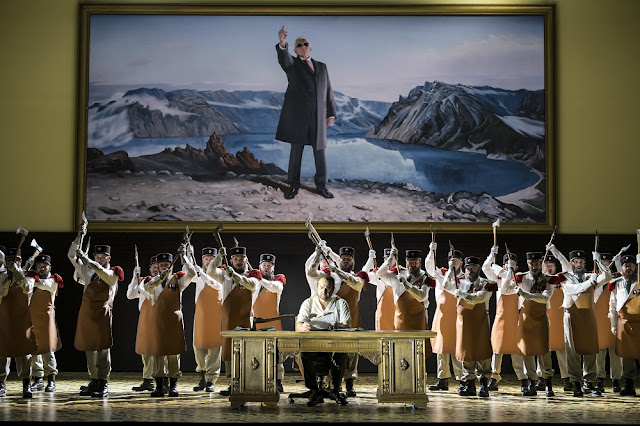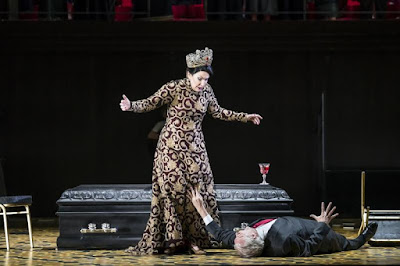 |
| Rossini: Semiramide - Michele Pertusi - Royal Opera (Photo Bill Cooper) |
Reviewed by Robert Hugill on Nov 20 2017 Star rating:
On the Covent Garden stage for the first time in over a century, Rossini's last Italian opera benefits from some spectacular vocal and dramatic fireworks
 |
| Joyce DiDonato - Royal Opera (Photo Bill Cooper) |
David Alden's production is shared with the Bavarian Staatsoper, Munich, where it has already premiered, and featured Joyce DiDonato in the title role, with Daniela Barcellona as Arsace, Lawrence Brownlee as Idreno, Jacquelyn Stucker as Azema, Balint Szabo as Oroe, and Konu Kim as Mitrane. Michele Pertusi was due to sing Assur but he was taken ill during the performance, so Pertusi sang Act One and Mirco Palazzi (who was due to sing the role next month) sang the second act. Sets were by Paul Steinberg and costumes by Buki Shiff, lighting by Michael Bauer and choreography by Beate Vollack. Antonio Pappano conducted the Royal Opera House Orchestra. The work was performed in the critical edition by Philip Gossett and Alberto Zedda.
Alden's production set the work in an unspecified contemporary Middle-Eastern country, the iconography of the design reflecting the sort of 'dictator art' from such regimes, with a huge statue of Nino (Semiramide's late husband), and large pictures of the happy ruling family. Patterns from Islamic tiles also featured heavily, but there was also a hint of the museum in the large-scale rooms. The setting for the climactic scene at the end of Act One rather resembled the Victoria and Albert Museum.
 |
| Joyce DiDonato, Daniela Barcellona - Royal Opera (Photo Bill Cooper) |
Alden seems to have used this semi-serious tone to include a vein of near comedy. Whilst I could understand his treatment of Azema (Jacquelyn Stucker), the fact that her dress meant she could barely totter, had no access to her hands and was carried everywhere simply drew titters from the audience around me. More worryingly the choreography by Beate Vollack in the ensemble numbers was surprisingly skittish, almost sending up the atmosphere of the opening scene, and as the chorus and dancers were in costumes inspired by Islamic modes of dress this also felt a remarkably tone deaf measure.
The arias and ensembles in the opera are remarkably long, and there was frankly an element of 'entertaining the troops' about Alden's staging. But, given the quality of the musical performance it was virtually impossible to upstage performances of the calibre and sheer musico-theatrical dazzle that we heard from Joyce DiDonato, Daniela Barcellona and Lawrence Brownlee. Both Michele Pertusi and Mirco Palazzi offered striking performances as Assur, with Palazzi opening Act Two with remarkable dramatic intensity, but given the circumstance and the fact that neither offered a complete performance it seems unfair to comment except to say that both artists provided a highly satisfying musico-dramatic performance.
 |
| Joyce DiDonato, Lawrence Brownlee - Royal Opera (Photo Bill Cooper) |
Daniela Barcellona continues to be go-to person at the moment for Rossini's travesty roles. She swaggers confidently, and sings the fioriture with the right degree of bravura and confidence. Occasionally her upper register seemed a little wayward, but this was a small thing. Arsace's duet with Assur in Act One, saw another dramatic highlight with Barcellona and Michele Pertusi knocking each other about musically as they competed for the love of Azema. Yet in Act Two, as I have said, things get more complex and Barcellona brought a finely nuanced approach to the moral complexities of the plot developments.
 |
| Joyce DiDonato - Royal Opera (Photo Bill Cooper) |
Jacquelyn Stucker gave a sympathetic account of Azema, within the limitations of Alden's conception of the role, singing her role finely. Balint Szabo made a strong Oroe, the High Priest, a relatively small role which is dramatically very important, whilst Konu Kim was firm and to purpose as Mitrane, the captain of the royal guard. Simon Shibamu sang the off-stage voice of Nino's ghost.
The production design lacked the fluidity of the previous day's production of Nico Muhly's Marnie at English National Opera (see my review), there was a lot of moving scenery around during the singing and a too great a reliance on that old chestnut, bringing the drop curtain down and having the singers complete the scene in front of it whilst thumps and bangs go on behind. And in the final scene, which takes place in the darkness of Nino's mausoleum, Alden and his team seem to have run out of ideas and simply kept the lights on and relied on our imagination.
Antonio Pappano and the orchestra gave us a fine account of Rossini's score. This has the sort of richness to it (which critics of the time referred to as Germanic), which makes it satisfying in the right hands. Pappano drew a nicely fluid account of the overture from the orchestra, and throughout they made fine partners for the fireworks happening on stage.
Rossini's Semiramide will always remain dramatically problematic, but Alden's production enable us to experience a wonderful combination of vocal fireworks and remarkably gripping drama.
Elsewhere on this blog:
- Dramatic sweep and elusive heroine: Nico Muhly's Marnie at ENO - Opera Review
- Distant Love: Ashley Riches and Anna Huntley at the London Song Festival - concert review
- Fables re-sung: Andre Caplet, Richard Rodney Bennett and more - concert review
- In the wake of oppression: Symphonies by Weinberg & Prokofiev from the Polish orchestra Sinfonia Iuventus - CD review
- The Contemporary String Quartet: The Borusan Quartet in Pärt, Uçarsu, Glass, Vasks - CD review
- Mesmerising Britten, fierce RVW: Brighton Philharmonic & Matthew Trusler - concert review
- A raw, spine-tingling delight: Maxwell Davies The Lighthouse from Shadwell Opera - Opera review
- Spirit messages & madness: Jessic Duchen introduces Ghost Variations, a novel & a concert, the story of the discovery of Schumann's violin concerto - interview
- Talented young line-up: Bach's Christmas Oratorio concludes BREMF 2017 - concert review
- Intimate & mesmerising: Monteverdi's L'Orfeo at BREMF 2017 - Opera review
- Home

.jpg)









I am interested to learn that Azema sang her aria finely -- actually she has no aria but only some lines of recitative (a lost opportunity given the beauty of Jacquelyn Stucker's voice but understandable given the great length of the opera). And your last line about "a remarkably dripping drama" is interesting...perhaps better-suited to Rusalka or Rheingold
ReplyDeleteTypos creeping in I'm afraid, corrected now. Thanks
Delete